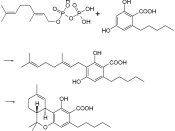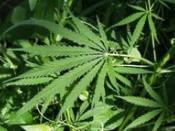Marijuana has an active chemical, "tetrohydrocannibinol or THC", which can be found within its leaves. It is one of the oldest hallucinogenic drugs known and contains approximately 60 different psychoactive chemicals called cannabinoids, of which the most important one is tetrahydrocannabinol (THC). The mode of action of THC is still not properly understood, but it is known that the cannabinoids are non-polar molecules, self-administered by smoking for the simple reason that such molecules are not soluble. In general, it is known that THC induces a euphoric effect giving a care-free feeling as well as relaxation. The brief feeling of euphoria can cause irrational and phobic delusions and can impair the individual's judgment leading them to function sub-consciously. Marijuana known effects include short term memory loss, relaxation and/or euphoric feelings initiated by sending false signals to brain receptors. This is an important aspect and also the center of controversy. When compared to alcohol, especially while driving, its supporters often mention various statistics on drunk driving, and the devastating effects of alcohol on the brain.
On the other hand, it has been noticed and recorded that in several events, car accidents, and in other various incidents, marijuana was either the main cause or greatly contributed to the impairment of the individual.
Marijuana is now being used legally for medical purposes such as to control nausea and vomiting, induced by chemotherapy. It appear to also lower intraocular pressure in glaucoma, as an anticonvulsant, as a muscle relaxant in spastic disorders, and as an appetite stimulant in the wasting syndrome of human immunodeficiency virus infection. It is also being utilized to relieve phantom limb pain, menstrual cramps, and other types of chronic pain, including migraines (The Science of Medical Marijuana, 2010).
Except for the harms associated with smoking, the adverse effects of...


